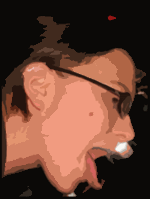Oh, now, really.
Ok, people. I know my grammar isn't perfect & lord knows I can't type for shit, but really. I just finished a MySpace quiz - "How country/city are you?" - and there are a couple country questions that make me want to cry a little.
[You] have went swimming in a river. Now, I know the present perfect is tricky. But, seriously? "Have went"? Is "have gone" too hard to type? Went is past tense. I get what they're shooting for - "I have gone swimming in a river [sometime n the past]." But, that's implied, kids. You just assume.
But, better. OH, so much better....
[You] have riddin' a horse to somewhere in town/or tractor. Lord have mercy on my tired little mind. Clearly, dude here means "ridden." But, I spent a couple solidminutes trying to figure out what this sentence - taken literally - would mean. Now, "riddin'" seems to be the southern-drop the "g" style of ridding. Which would come from the root "rid." Rid = to relieve/remove from. Word. Now, the backslash. Typically, only combines the words/phrases it touches (see how that works there?). Here, that would be the town and..... tractor? Hey, you wrote it, guy. So, you're relieving or removing a horse from place #1 to somewhere either in town or in the tractor. If you say so, dude. Good luck with that.
Sorry for that. I feel better.
Love for everyone. And, a grammar book for the kid that wrote this.
[You] have went swimming in a river. Now, I know the present perfect is tricky. But, seriously? "Have went"? Is "have gone" too hard to type? Went is past tense. I get what they're shooting for - "I have gone swimming in a river [sometime n the past]." But, that's implied, kids. You just assume.
But, better. OH, so much better....
[You] have riddin' a horse to somewhere in town/or tractor. Lord have mercy on my tired little mind. Clearly, dude here means "ridden." But, I spent a couple solidminutes trying to figure out what this sentence - taken literally - would mean. Now, "riddin'" seems to be the southern-drop the "g" style of ridding. Which would come from the root "rid." Rid = to relieve/remove from. Word. Now, the backslash. Typically, only combines the words/phrases it touches (see how that works there?). Here, that would be the town and..... tractor? Hey, you wrote it, guy. So, you're relieving or removing a horse from place #1 to somewhere either in town or in the tractor. If you say so, dude. Good luck with that.
Sorry for that. I feel better.
Love for everyone. And, a grammar book for the kid that wrote this.





0 Comments:
Post a Comment
<< Home